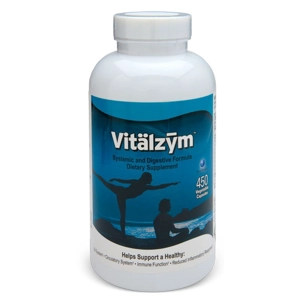
INGREDIENTS
| Serrapeptase |
Also known as Serratia peptidase; a proteolytic enzyme isolated from the non-pathogenic enterobacteria Serratia E15. Studies show that Serrapeptase induces fibrinolytic, anti-inflammatory and anti-edemic (preventing swelling and fluid retention) activity in a number of tissues. Its anti-inflammatory effects are widely believed superior to other proteolytic enzymes. Another primary benefit of Serrapeptase is the reduction of pain; particularly in the enzymes ability to block the release of pain-inducing amines from inflamed tissues. Physicians in Europe and Asia use Serrapeptase in treatment as an alternative to aspirin, ibuprofen, and other NSAIDs.* |
|---|---|
| Bromelain |
An enzyme found in pineapples that breaks down other proteins, such as collagen and has anti-inflammatory properties.* |
| Papain |
A proteolytic enzyme obtained from the unripe papaya. |
| Protease |
An enzyme that catalyzes the splitting of proteins into smaller peptide fractions and amino acids by a process known as proteolysis. |
| Amylase |
A group of proteins found in saliva and pancreatic juice and parts of plants. Amylase digests carbohydrates and helps convert starch to sugar. |
| Lipase |
Lipase digests fat. It is an enzyme secreted in the digestive tract that catalyzes the breakdown of fats into individual fatty acids that can be absorbed into the bloodstream. |
| Rutin |
One of the many existing flavonoids. Flavonoids support health by strengthening capillaries and other connective tissue, and some function as anti-inflammatory, antihistaminic, and antiviral agents.* |
| Amla |
Amla is one of the richest sources of Vitamin C. It also contains tannic acid, glucose, protein, cellulose and calcium. Amla is considered to have restorative and preventive properties.* |
| Other Ingredients |
Rice extract, cellulose, water (Vegetarian Capsule) |
| Quality Commitment: |
Serrapeptase/protease/proteinase: lab cultured in a protein (fungus) medium; extracted and filtered for purity All ingredients are non-GMO. |
 AED
AED AFN
AFN ALL
ALL AMD
AMD ANG
ANG AOA
AOA ARS
ARS AUD
AUD AWG
AWG AZN
AZN BAM
BAM BBD
BBD BDT
BDT BGN
BGN BHD
BHD BIF
BIF BMD
BMD BND
BND BOB
BOB BRL
BRL BSD
BSD BTN
BTN BWP
BWP BYN
BYN BYR
BYR BZD
BZD CAD
CAD CDF
CDF CHF
CHF CLF
CLF CLP
CLP CNH
CNH CNY
CNY COP
COP CRC
CRC CUC
CUC CUP
CUP CVE
CVE CZK
CZK DJF
DJF DKK
DKK DOP
DOP DZD
DZD EGP
EGP ERN
ERN ETB
ETB EUR
EUR FJD
FJD FKP
FKP GBP
GBP GEL
GEL GGP
GGP GHS
GHS GIP
GIP GMD
GMD GNF
GNF GTQ
GTQ GYD
GYD HKD
HKD HNL
HNL HRK
HRK HTG
HTG HUF
HUF IDR
IDR ILS
ILS IMP
IMP INR
INR IQD
IQD IRR
IRR ISK
ISK JEP
JEP JMD
JMD JOD
JOD JPY
JPY KES
KES KGS
KGS KHR
KHR KMF
KMF KPW
KPW KRW
KRW KWD
KWD KYD
KYD KZT
KZT LAK
LAK LBP
LBP LKR
LKR LRD
LRD LSL
LSL LYD
LYD MAD
MAD MDL
MDL MGA
MGA MKD
MKD MMK
MMK MNT
MNT MOP
MOP MRO
MRO MRU
MRU MUR
MUR MVR
MVR MWK
MWK MXN
MXN MYR
MYR MZN
MZN NAD
NAD NGN
NGN NIO
NIO NOK
NOK NPR
NPR NZD
NZD OMR
OMR PAB
PAB PEN
PEN PGK
PGK PHP
PHP PKR
PKR PLN
PLN PYG
PYG QAR
QAR RON
RON RSD
RSD RUB
RUB RWF
RWF SAR
SAR SBD
SBD SCR
SCR SDG
SDG SEK
SEK SGD
SGD SHP
SHP SLL
SLL SOS
SOS SRD
SRD SSP
SSP STD
STD STN
STN SVC
SVC SYP
SYP SZL
SZL THB
THB TJS
TJS TMT
TMT TND
TND TOP
TOP TRY
TRY TTD
TTD TWD
TWD TZS
TZS UAH
UAH UGX
UGX UYU
UYU UZS
UZS VES
VES VND
VND VUV
VUV WST
WST XAF
XAF XCD
XCD XOF
XOF XPF
XPF YER
YER ZAR
ZAR ZMW
ZMW ZWL
ZWL





